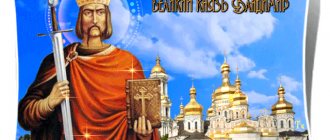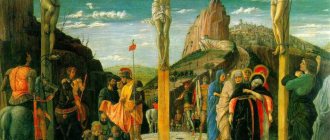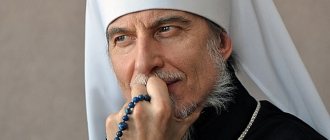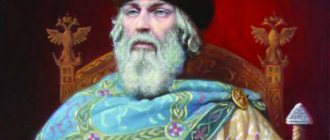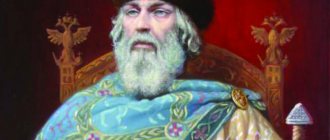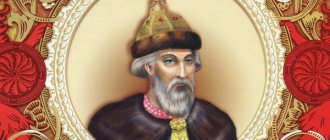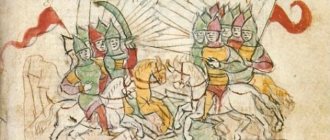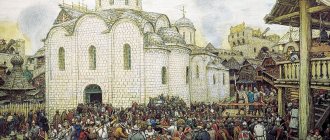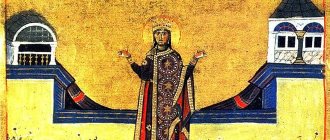| Sschmch. Vladimir (Bogoyavlensky) |
Vladimir (Epiphany)
(1848 - 1918), Metropolitan of Kiev and Galicia, spiritual writer and preacher, hieromartyr, first bishop-new martyr of the Russian Church Memory January 25, June 14 - memory of the discovery of relics in 1992 (Ukrainian [1]), in Councils of New Martyrs and Confessors of the Russian Church, Saints of Kiev, Moscow, St. Petersburg and Samara
In the world, Vasily Nikiforovich Bogoyavlensky, was born on January 1, 1848 in the village of Malaya Morshevka, Morshansky district, Tambov province, into the family of a priest.
In 1864 he graduated from the Tambov Theological School [2].
He received his secondary education at the Tambov Theological Seminary, and higher education at the Kyiv Theological Academy, which he entered in 1870 and graduated on May 24, 1874 with a candidate of theology degree and the right to a master's degree.
After graduating from the academy in the same year, he was appointed to the Tambov Seminary as a teacher in Homiletics, Liturgics and Pastoral Theology.
A year later he moved to the department of Holy Scripture, at the same time he taught German at the seminary and had lessons in geography, first at the diocesan women's school, and then at the women's gymnasium. But his religious mood attracted him to the pastorate.
After serving in Tambov for about eight years, he got married, left service at the seminary, and on January 31, 1882, was ordained a priest in the Intercession Cathedral Church in the city of Kozlov (now Michurinsk).
In 1883, he was transferred to the position of rector of the Trinity Church in the city of Kozlov and appointed dean of local city churches. Already here he showed himself to be an outstanding preacher and paid special attention to outside liturgical conversations as the best means of religious education. Having lost his wife and only child at an early age, Fr. In his grief, Vasily heard a voice calling him to “leave the world and those in the world” and give all of himself to the service of the Church.
On February 8, 1886, he took monastic vows with the name of Vladimir at the Tambov Kazan Monastery and the next day he was elevated to the rank of archimandrite and appointed rector of the Tambov Trinity Monastery.
On October 6 of the same year, he was appointed rector of the Novgorod St. Anthony second-class monastery.
Bishop of Starorussky
On June 13, 1888, he was consecrated Bishop of Starorussky, vicar of the Novgorod diocese with his seat in the city of Novgorod. The consecration in the Alexander Nevsky Lavra was led by Metropolitan Isidore (Nikolsky).
The flock was attracted by the reverent and magnificent service of the bishop and especially by his preaching, imbued with firm faith, love for ministers and fiery zeal for God, and, at the same time, simple and artless, accessible to everyone in its form. A monument to this is his “Conversations on the Seven Words of the Savior from the Cross.”
Bishop of Samara
On January 19, 1891 he was appointed Bishop of Samara.
He introduced non-liturgical interviews in various churches and attended them. To spread spiritual enlightenment among the people, Bishop Vladimir founded the Alekseevsky religious and educational brotherhood in Samara and convened lovers of spiritual enlightenment for spiritual and moral readings at the seminary. He paid careful attention to religious educational institutions and to the development of parochial schools for men and women.
He served often and in all even the smallest churches. But he did especially a lot in the Samara diocese during the crop failure and the subsequent cholera epidemic. Under his personal supervision, Bishop. Vladimir established a diocesan Committee to provide benefits to those affected by crop failure. Diocesan committees were also established in district towns. The bishop himself, both in printed appeals and in teachings, tried to incite everyone to help the victims. All the abbots of churches and monasteries were involved in this matter.
During the devastating cholera epidemic, which claimed many thousands of victims, Bishop Vladimir began to organize public prayers in prominent places and squares of the city and addressed thousands of people with words of consolation and encouragement, at the same time pointing out precautions against the disease.
Exarch of Georgia
On October 18, 1892, he was appointed Archbishop of Kartalin and Kakheti, Exarch of Georgia, with the title of member of the Holy Synod.
In Georgia, as in Samara, the Bishop set himself the first task of promoting the development and strengthening of enlightenment and faith in the region in the spirit of the Orthodox Russian Church. He established extra-liturgical interviews and church teaching during services, involving the parish clergy in this by all means and was the first to set an example for this. Despite all the inconvenience of communications in the Caucasus, he very often undertook trips across the vast region, everywhere meeting the spiritual and material needs of the clergy and flock. Sectarians, schismatics and others were all the subject of the archpastor’s careful attention, who managed, during his administration of the exarchate, to achieve a rapprochement between non-Orthodox elements and Orthodoxy.
During the service of the Bishop in Georgia, more than a hundred churches were built and more than three hundred parochial schools were opened, the activities of the Society for the Restoration of Orthodox Christianity in the Caucasus were revived, and funds were found for the restoration of ancient churches. A missionary diocesan spiritual and educational brotherhood was established. During cholera in the Caucasus, canteens for the poor people were set up at Tbilisi churches.
Since 1897, he was an honorary member of the Kazan Theological Academy “in consideration of his fruitful archpastoral and missionary labors.”
| Metropolitan Vladimir (Bogoyavlensky) |
Metropolitan of Moscow
On February 21, 1898, he was appointed Metropolitan of Moscow and Kolomna, as well as Holy Archimandrite of the Holy Trinity Sergius Lavra.
He was among the hierarchs who signed the resolution of the Synod on the excommunication of Count L.N. in 1901. Tolstoy from the Russian Church.
Signed the resolution of the Synod on the opening of the relics of St. Seraphim of Sarov, St. Pitirim of Tambov and St. Joasaph of Belgorod, and also accepted a petition for the discovery of the relics of Patriarch Hermogenes.
Under him, the building of the Diocesan House was built, where all diocesan, spiritual, educational institutions and a church in the name of St. Prince Vladimir. Lectures, readings, and conversations were held in the halls of the Diocesan House. A large room in the house was allocated for the diocesan library and reading room. The editorial office of spiritual magazines was also located here.
As the spiritual leader of Grand Duchess Elisaveta Feodorovna, Metropolitan Vladimir assisted her in founding the Martha and Mary Convent.
In recent years, the Bishop has paid special attention to the fight against public drunkenness. In 1911, under his auspices, the Russian Anti-Alcohol Congress of 1911 took place.
Metropolitan of St. Petersburg
On November 23, 1912, he was appointed Metropolitan of St. Petersburg and Ladoga, Holy Archimandrite of the Holy Trinity Alexander Nevsky Lavra and primate member of the Holy Synod.
Despite the fruitful activities of Metropolitan. Vladimir, in the literature there are attempts to characterize him as a selfish person who clings to the power that belongs to him, and for this he does not disdain any techniques.
Thus, the former hieromonk Iliodor, defrocked Sergei Turfanov, writes in his notes about Rasputin that Metropolitan Vladimir, when he was in St. Petersburg, did not, together with other honest servants of the Church of God, denounce Rasputin, fearing to fall out of favor. Therefore, he agreed with the opinion of the Holy Synod on the exile of Bishop Hermogenes (Dolganev), for which, after Bishop Hermogenes was expelled from the capital, he was allegedly generously rewarded by Rasputin. However, it is characteristic that exactly three years after his appointment as Metropolitan of St. Petersburg, the first member of the Synod, the honored archpastor, who had worked hard and won universal love and respect, who had been in the rank of metropolitan for eighteen years, was suddenly transferred to Kiev, to the youngest of the three metropolitan sees, and Pitirim (Oknov), who had just been elevated to the rank of metropolitan, was appointed in his place. This is not the case with careerists, the favorites of the powerful of this century.
As an accusation against Metropolitan Vladimir, another case is cited, which at one time caused a lot of noise and gave rise to many complaints against him when he was still an archbishop, Exarch of Georgia.
| Sschmch. Vladimir (Bogoyavlensky) |
The rector of the Tiflis Seminary, Archimandrite Seraphim, in the presence of seminary students, called Georgian church singing “the barking of a dog.”
This was followed by a violent outburst of indignation, which also spread to Archbishop Vladimir. Instead of properly punishing the offending archimandrite and thereby pacifying the troubled region, Archbishop Vladimir for some reason took the rector of the seminary under his protection and thereby caused great discontent among Georgian nationalists. This incident not only increased the number of his enemies, but also helped to reveal another trait of his character. By taking Archimandrite Seraphim under his protection, Archbishop Vladimir endangered his own well-being and popularity, and perhaps even safety. At this time, Georgia was seething with special hatred against everything Russian, which reached such proportions that ten years after the event described, nationalists killed Archbishop Nikon, who was there at that time. For Archbishop Vladimir it would have been much easier and calmer to sacrifice one person who, in the heat of the moment, said a really very rude, perhaps outrageous, phrase. But he realized that this was said in the heat of the moment and was not afraid of any thunder and lightning. Under such circumstances, this act of Archbishop Vladimir required great courage and inner independence.
Kyiv Metropolitan
On November 23, 1915 he was transferred to the Kyiv department. He retained the title of leading member of the Holy Synod and the rights associated with this title.
In the same year, Metropolitan Vladimir was awarded the degree of Doctor of Theology.
The October Revolution of 1917 caused disturbances in church life in Ukraine. The diocesan congress of clergy and laity held in Kyiv at that time formed an independent administration and called for the creation of an “independent” Ukrainian Church. Speaking against the restructuring of the diocese’s way of life and non-canonical actions to form autocephaly, Metropolitan Vladimir called on pastors and flocks to avoid hostility and prevent schism.
| Posthumous photograph of Hieromartyr Vladimir (Epiphany) from the website Bogoslov.Ru |
Martyrdom
On January 22, 1918, rifle and artillery shelling of Kyiv from Darnitsa began. By the evening of January 23, the Bolsheviks took possession of the Kiev-Pechersk Lavra, and then such wild violence and manifestations of barbarism began in it, before which the tales known to us from ancient chronicles about the robberies and violence carried out by the Mongols during the ruin of Kyiv and the Lavra in 1240 pale in comparison. Armed crowds of people burst into churches, with hats on their heads and cigarettes in their mouths, made screams, noise, and outrages during worship, uttered unspeakable curses and blasphemies against the shrine, broke into the homes of monks day and night, shot over the heads of mortally frightened old people, They carried out indescribable literary desecrations of shrines, beat old people, robbed whatever they could get their hands on, stopped the monks in the courtyard during the day, forced them to undress and take off their shoes, searched and robbed, mocked and flogged with whips, grabbed strangers who were in the monastery at that time, especially military men, They were given the cruel death penalty...
On the evening of January 25, five armed soldiers led by a sailor came for Metropolitan Vladimir. According to one casual eyewitness to the martyrdom of the bishop, the killers brought St. Vladimir to the place of execution in a car. When the killers took the metropolitan out of the car and stopped on the site, the martyr archpastor turned to his killers with the following words: “What, do you want to shoot me here?” One of them replied: “Why should I stand on ceremony with you?” Then the Metropolitan asked them for time to pray to God. One of the killers said: “But hurry up!” The Metropolitan raised his hands up and said: “Lord, forgive my sins, voluntary and involuntary, and accept my spirit in peace,” then he blessed his killers in a cross shape with both hands and said: “The Lord blesses and forgives you.” And after that, when the Metropolitan had not yet had time to give up, three shots were heard, and the Metropolitan fell. The killers approached their victim and fired several shots at the lying man.
The medical examination of the body of the murdered metropolitan subsequently showed that the archpastor-martyr was shot with explosive bullets and stabbed with cold steel.
| The righteous death of Sschmch. Vladimir Kievsky. 11th mark of the icon of the Council of New Martyrs and Confessors of Russia from the Cathedral of Christ the Savior. |
Reverence
Saint Tikhon, Patriarch of Moscow and All Russia, said this about the martyrdom of Metropolitan Vladimir:
“Of course, judging from a human perspective, this death seems terrible, but there is nothing in vain in the ways of God’s Providence, and we deeply believe that this martyrdom of Vladika Vladimir was not only by the cleansing of his voluntary and involuntary sins, which are inevitable for everyone who wears flesh, but also by a fragrant sacrifice to cleanse the sins of the great Mother Russia.”
The relics of Metropolitan Vladimir were found on July 1, 1992 and placed in the Far Caves of the Kiev Pechersk Lavra.
The Consecrated Council of Bishops of the Russian Orthodox Church, by its act of April 4, 1992, canonized Metropolitan Vladimir (Epiphany) among the holy new martyrs and confessors of the Russian Church. On the icon painted for their Cathedral glorification in 2000, the martyrdom of the Holy Martyr Vladimir was shown on the eleventh hallmark. The saint is shown twice: being led out of the monastery to be shot and his body being discovered by monks. The prone body of the saint in composition is located almost in the center of the row and vertically, coinciding with the central images of the deisis and the middle, in order to emphasize the significance of the feat. The blue-green color of his mantle is not repeated in the clothes of the saints in the stamps, but is close to the vestments of Christ and the saints in the images of the Deesis rank, which establishes the semantic unity of the images.
Bishopric
The future life of Vladimir’s father was changing rapidly, so the following points can be highlighted:
- May 21, 1888 - approval by the emperor of the report on “the existence of Archimandrite Vladimir”, appointment as bishop of Starorussky and vicar of the Novgorod diocese.
- January 19, 1891 - becoming Bishop of Stavropol and Samara.
Icon of St. Vladimir of the Epiphany
When Vladimir took these positions, he began to treat his work even more reverently. He continued his preaching practice and personally spoke with parishioners in his free time. He did everything possible to improve the well-being of his dioceses.
Upon receiving second ranks, Father Vladimir:
- Founded a religious and educational brotherhood.
- He became the founder of the practice of spiritual and moral readings in the hall of the City Duma.
- Opened women's church schools.
- During the cholera epidemic in the Volga region, he performed memorial services in cemeteries in person and served prayer services in squares. In addition, he continued to instill faith in people who were infected with a terrible disease.
Soon Konstantin Pobedonostsev, a prominent statesman, learned about Father Vladimir. It was then that a rapid climb up the career ladder began.
Prayers
Troparion, tone 2
The immaculate guardian of the Orthodox faith/ and the zealous executor of the commandments of Christ,/ Hieromartyr Vladimir,/ having loved Christ with all my heart,/ thou hast well taken care of thy flock,/ kindly You have accepted the death of the chen./ For this reason, abiding in eternal glory,// pray for our souls to be saved.
Troparion, tone 4
You fought a good fight, like the saint of Christ, / keeping the Orthodox faith immaculately, / in the days of persecution of the fierce tormentors, you were not afraid of repression, / Hieromartyr Vladimir, / like the first martyr Stephen, to those who kill you you say:/ May the Lord forgive you/ For this reason have you been prepared for a crown of righteousness ,/may the Lord reward him with your prayers//to all who honor you.
Kontakion, tone 2
Showing the image of Christ's mercy,/ you were the protection and protection of your flock,/ you were the holy hierarch Father Vladimir,/ in meekness and gentleness you accepted suffering,/ you blessed and forgave the godless tormentors You are./ In the same way, ask us from Christ the God// a spirit of peace and greatness mercy.
Kontakion, voice 3
to transfer the relics
In the time of fierce persecution, the true priest of Christ appeared, / first affirming the word of the Gospel, / and offering a bloodless Sacrifice to the Lord, / and followed with your blood in holiness Who has entered,/ Hieromartyr Vladimir,/ pray to Christ God,/ to give unity to our Church and to the fatherland to be preserved from the captivity of the anti-Christ fighters, // and to improve the salvation of our souls.
Proceedings
- Word for the New Year. “Samar. EV" 1892, No. 1, p. 21.
- Sermon on the 6th Sunday after Pentecost. “Samar. EV" 1892, No. 11, p. 614.
- Speech at the presentation of the staff of Rev. Trifon July 1, 1901 “Approx. to "CV" 1901, No. 29, p. 1071-1019.
- To the unbelievers and those of little faith. M., 1901.
- A word spoken before the start of moral and religious readings for the workers of Moscow. "Arr. to "CV" 1902, No. 48, p. 1675-1679.
- Word on the Day of Pentecost. "Arr. to "CV" 1905, 3 27, p. 1105-1106.
- Conversations on the seven words of the Savior from the cross. St. Petersburg, 1899.
- Letter from Vladimir, Bishop of Samara. “Ms. Review." 1901, March, p. 217.
- Against those who deny the veneration of saints. M. 1906, separate reprint from No. 8 of the magazine “Faith and Church” for 1902.
- Where is true happiness - in faith or unbelief. St. Petersburg, 1905.
- “Voice of the Church”, 1914, January-June.
- "On Labor and Property". Moscow, 1905.
- “Voice of the Church” 1912, December, p. 5-18.
- "To rich and poor." Moscow, 1906.
- "The social task of the family." Moscow, 1906.
- "About a work issue." Based on the Gospel parable of the workers and the vineyard (Matthew 20: 1-16.). Moscow, 1907.
- "Conversation of Jesus Christ with Nicodemus." Moscow, 1908.
- Speech at the opening of the monastic congress on July 5, 1909 in the Trinity-Sergius Lavra. "Arr. to "CV" 1909, No. 32, p. 1457.
- Our pastoral task is in the fight against social democratic propaganda. Moscow, 1909.
- “Voice of the Church” 1914, September, p. 7-18.
- Speech when naming archm. Vladimir as Bishop of Old Russian on June 8, 1888. "Arr. to "CV" 1888, No. 25, p. 678-680.
- The unbelief of the scribes and Pharisees of ancient and modern times, its imaginary foundations and real reasons. M., 1909.
- Word of the Most Reverend Vladimir on the opening day of the Moscow Diocesan Society for the Fight against Drunkenness. "Arr. to "CV" 1910, No. 44, p. 1839.
- A word on the day of the tenth anniversary of the Russian Assembly, delivered on January 30, 1911. "Arr. to "CV" 1910, No. 44, p. 1839.
- Archpastoral call of the clergy and society to combat drunkenness. St. Petersburg, 1911. “Approx. to "CV" 1911, No. 7, p. 257-271.
- "Goal. Churches" 1913, June-October.
- Word on the Nativity of John the Baptist. "Arr. to "CV" 1911, No. 29, p. 1247.
- Speech at the meeting of the missionary society “Worldwide Vocation of the Church.” "Arr. to "CV" 1911, No. 44, p. 1861.
- The word Vysokopreos. Metropolitan, said at the Martha and Mary Convent of Mercy on October 23, 1911. "Arr. to "CV" 1911, No. 45, p. 1905.
- Speech at the meeting of the sovereign in Borodino on August 25, 1912 “Approx. to "CV" 1912, No. 37, p. 1469-1470.
- Pastoral conversations with children. Ed. 1st. Moscow, 1912. Petrograd, 1915.
- On the right of church excommunication or anathematization. Moscow, 1912.
- "Goal. Church" 1912, November, p. 3-35.
- The gospel of childhood, a gift for children. Moscow, 1912.
- "Goal. Churches" 1912, May-August.
- Science and religion. Moscow, 1912.
- "Goal. Church" 1912, May, p. 58-81.
- Evidence for the existence of God. Moscow, 1912.
- "Goal. Church" 1912, April, p. 33-54.
- Homily on the third day of Easter, delivered at the Marfo-Maryinsky Convent of Mercy. Moscow, 1912, ed. 2nd.
- "Goal. Church" 1912, April, p. 311.
- Word for the day of Holy Easter. Moscow, 1912.
- "Goal. Churches 1912, March, p. 19-27.
- To young men (New Year wishes). Moscow, 1912.
- “Two heavenly gifts of God in humanity.” Moscow, 1912.
- Working in the light of materialism and Christianity. Moscow, 1909. “Approx. to "CV" 1912, No. 40, p. 1597.
- “Against socialism”, a word spoken at a meeting of workers. "Arr. to "CV" 1913, No. 3, p. 121. Ed. 1st.
- "Goal. Churches" 1913, January, p. 18-27.
- The word is against socialism. Moscow, 1913. Publ. 2nd.
- A word about true happiness. Moscow, 1913.
- "Goal. Church" 1913, December, p. 10.
- A word spoken on August 29 on the day of the All-Russian holiday of sobriety. "Arr. to "CV" 1913, No. 38, p. 1701.
- "Goal. Church" 1913, November, p. 3-14.
- Speech given during the first visit to the Alexander Gymnasium on September 15, 1913. "Arr. to "CV" 1913, No. 39, p. 1757.
- Word (On the 18th week after Pentecost). “Approach to “CV” 1913, No. 43, p. 1961.
- Speech at the consecration of the new building of the 3rd St. Petersburg Gymnasium on October 27, 1913. “Approach to “CV” 1913, No. 45, p. 2063.
- "Goal. Church" 1913, December, p. 16-21.
- Speech at the presentation of the staff to Bishop Sergius, head of the Urmia mission. "Arr. to "CV" 1913, No. 50, p. 2309.
- "Goal. Church" 1914, March, p. 21-26.
- Speech at the presentation of the staff to Alexy, Bishop of Nikolaev on December 18, 1913. "Arr. to "CV" 1913, No. 51-52, p. 2357.
- Word for the third day of Easter. Evang. Onion. 24, 13-35. “Approach to “CV” 1914, No. 16, p. 743.
- "Goal. Churches", 1914, June, p. 3-9.
- Word to the children of the Holy Orthodox Church of Christ (August 17, 1914). "Arr. to "CV" 1914, No. 34, p. 1497.
- "Goal. Church" 1914, September, p. 1-4.
- Extra-liturgical conversation of 1914, August 15, about the war. "Arr. to "CV" 1914, No. 35, p. 1545.
- Pastoral consolation for a Christian in the disasters of war. "Arr. to "CV" 1914. No. 37-38, p. 1611.
- "Goal. Church" 1914, November, p. 3-21.
- The word spoken by the Metropolitan in the Peter and Paul Church, Obukhov plant on September 21, 1914. "Arr. to "CV" 1914, No. 39, p. 1671.
- Speech at the presentation of the staff of Rev. Sevastin, Bishop of Kneshensky. "Arr. to "CV" 1914, No. 39, p. 1675.
- Speech delivered at the congress of the clergy of the Petrograd diocese on November 25, 1914. "Arr. to "CV" 1914, No. 50, p. 2036.
- A word on Christmas Day when distributing Christmas gifts to children. "Arr. to "CV" 1915, No. 2, p. 27.
- "Goal. Church" 1915, December, p. 3-9.
- Sermon on the Sunday of the Publican and Pharisee. "Arr. to "CV" 1915, No. 4, p. 85.
- “Voice of the Church” 1916, January, p. 3-9.
- Roman amphitheater and Christian martyrs. Sergiev Posad, 1900; Petrograd, 1915.
- Homily upon entering the last week of St. Pentecostals. "Arr. to "CV" 1916, No. 14, p. 379.
- Word on the consecration of Evdokim, bishop. Volokolamsky. “Theologian.” West." 1904, March, p. 409.
- Word after the fourth Gospel of the Passion of Christ. “Voice of the Church” 1912, March, p. 3-12.
- Words at a prayer service before the opening of the anti-alcohol congress in Moscow on August 6, 1912. "Goal. Church" 1912, October, p. 1-9.
- Word on the Day of the Dormition of the Mother of God. "Goal. Church" 1912, October, p. 10-15.
- “Is the Bible against us (abstinents)?” "Goal. Churches" 1913, February-May.
- About Christian deed. "Goal. Church" 1913, November, p. 22-27.
- Pastoral voice during the war. Petrograd, 1914. “Goal. Church" 1914, October, p. 3-18.
- The Church is facing the demands of life. "Goal. Churches" 1915, January, p. 3-10.
- Parenting. "Goal. Churches" 1915, March-November. -“- 1916, February-August.
- Thoughts on the modern press. "Goal. Churches" 1916, April-May, p. 3-20.
- Joy and pleasure. // “Soulful reading.” 1916, Jan.-Feb.
- Speech at the presentation of the staff to Bishop Pimen, head of the Urmia mission, August 6, 1916. "Goal. Church" 1916, October, p. 3-9.
- About anger. // “Soulful reading.” 1916.
- About the veneration of saints. "Goal. Churches" 1916, November, December, p. 3-10.
- Stinginess. // “Soulful reading.” 1916.
- Christian prayer for the disasters of war.
- The Lord's Prayer in 9 Discourses.
- Conversation about sins against the Holy Spirit.
- The agreement of some apparently contradictory passages of Holy Scripture.
- Evening interviews between peasant, worker and priest: Contemporary religious issues. M.V. Sergiev Posad. 1908. 336 p.
- Monarchy or republic.
- The world's greatest deceiver.
- Archpastoral teaching to children about the Holy Bible.
- Cultivating a sense of modesty.
- Fostering self-restraint and self-sacrifice.
- Cultivating truthfulness.
- Envy.
- Parental vigilance.
- About punishment as an educational means.
- The fight against the main vice of a child.
- The suffering of Christ and the suffering of the Church. M.V. St. Petersburg, 1907.
Metropolitan of St. Petersburg
On November 23, 1912, Vladimir also became the metropolitan of the capital. He was given the rank of first member of the Holy Synod. Before accepting new responsibilities, Vladimir came to Moscow where he “said goodbye to his flock.”
In 1915, the future martyr was awarded the degree of Doctor of Theology. Vladimir actively opposed Grigory Rasputin, thanks to which he soon became very “popular”. Because of this, in the same year the priest was removed from the post of metropolitan of the capital and was moved to Kyiv, where he took up a new post.
Literature
- “Church. Ved." 1888, No. 23, p. 155
- -“- 1891, No. 4, p. 29.
- -“- 1892, No. 43, p. 428.
- -“- 1898, No. 9, p. 43.
- -“- 1900, No. 17, p. 130.
- -“- 1910, No. 24, p. 262.
- -“- 1912, No. 34, p. 331.
- -“- 1913, No. 7-8, p. 33.
- -“- 1914, No. 25, p. 283.
- -“- 1918, No. 5, p. 25.
- -“- 1912, No. 47, p. 428.
- "Arr. to "CV" 1888, No. 25, p. 678.
- -“- 1891, No. 46, p. 1639.
- -“- 1900, No. 52, p. 2180, 2181.
- -“- 1909, No. 24, p. 1095.
- -“- 1911, No. 6, p. 213.
- -“- 1912, No. 47, p. 1893-1897.
- -“- 1912, No. 50, p. 2005-2023.
- -“- 1913, No. 23, p. 1098.
- “Church. Vestn." 1891, No. 5, p. 74.
- -“- 1891, No. 18, p. 275.
- -“- 1895, No. 19, p. 595.
- -“- 1908, No. 30, p. 936.
- “Samar. EV" 1891, No. 4, p. 29.
- -“- 1891, No. 5, p. 154.
- -“- 1892, No. 1, p. 32-33.
- -“- 1892, No. 3, p. pp. 143-146.
- -“- 1892, No. 4, p. 184.
- -“- 1892, No. 22, p. 873, 977.
- -“- 1892, No. 23, p. 1072-1075.
- -“- 1903, No. 5, p. 27.
- -“- 1903, No. 14, p. 379.
- “Russian. Monk" 1911, issue. 5, p. 35.
- "Rus. Palom." 1912, No. 49, p. 773, 774.
- "Izv. Kaz. Ep." 1907, No. 31-32, p. 908.
- -“- 1911, No. 9, p. 271.
- -“- 1912, No. 16, p. 521-522.
- -“- 1912, No. 14, p. 1242.
- -“- 1912, No. 45, p. 1351, 1361-1367.
- -“- 1913, No. 3, p. 108.
- "Izv. Kaz. Ep.” 1913, No. 26, p. 773-779.
- -“- 1913, No. 27-28, p. 835.
- -“- 1913, No. 39, p. 1174.
- -“- 1914, No. 5, p. 152.
- -“- 1914, No. 6, p. 177.
- -“- 1914, No. 11, p. 334.
- "Red Archive" 1928, vol. 26, p. 120.
- -“- 1930, vol. 40, p. 91, 112.
- -“- 1930, vol. 39, p. 119, 121.
- -“- 1936, t. 1(74), p. 169.
- -“- 1936, t. 4(77), p. 201.
- “Histor. Vestn." 1908, May, p. 765.
- -“- 1913, March, p. 10, 17, 19, 20, 22.
- -“- 1913, July, p. 375.
- "Spirit. Vestn." 1896, no. 9; St. Petersburg.
- -“- 1898, No. 6, Gruz. Exarchate.
- “Right. Social security.” 1899, No. 1, p. 7.
- "Rus. Archive." 1912, No. 3, p. 399.
- “Ms. Oboz.” 1901, March, p. 297.
- "Christ's Rest" 1908, August-September, p. 59.
- "Niva" 1892, No. 47, p. 1039-1040.
- "ZhMP" 1957, No. 12, p. 38.
- “Holy Father. Christomathy." With. 220.
- Bulgakov, p. 1399, 1405, 1411.
- BES vol. I, stb. 530, 532, 686.
- BES vol. II, stb. 1602, 1993.
- BEL vol. III, stb. 578, 586.
- BEL vol. IV, stb. 731.
- NES vol. X, stb. 937, 938.
- Denisov, s. 527.
- Kliodor, p. 101, 107, 148.
- Runkevich S.G. "Alexandro-Nevsky Lavra", 1713-1913."
- Polivanov A.A. "From diaries and memories." 1907-1916 vol. 1. Moscow, 1924, June, p. 104.
- Titov F.N. Prof.-Prot. "Metropolitan Vladimir". Kyiv, 1918.
- “Ms. Calendar" 1907-1908, p. 130.
- “Composition of the Holy Rules. All R. Syn. and Ros. Church Hierarchies for 1917", p. 4-5.
- "Memorable Petrogr's book Spirit. Academician for 1916-1916,” p. 6.
- Aivazov I. “High-performance.” Vladimir, Metropolitan of St. Petersburg and Ladoga."
- "Goal. Church" 1912, December, p. 3-18.
- "List of bishops of the All-Russian Hierarchy." SPb., 1896, No. 513, p. 77.
- Corrections and additions by A.A.
- Erster Martzrer der ROK in der Revolution.
- M. Pol'skij, Novye muceniki I, 10-24; II, 172.
- Nikodimov, J. Vospominanie o Kievo-Pecerskoj Lavre, Munchen 1960, S. 97-106; 108-109.
- Joh. Chrysostomus, Kirchengeschichte I, 117-120, passim; II, 72, 74, 89, 194, 219; III, 20.
- Miller, Novye muceniki rossijskie, in: Prav. Put' 1975, 74-85.
- Regel'son 228, 523.
- Struve 33, 502.
- Rklickij, Zizneopisanie IV, 150, 214.
- Obituary. His Eminence Metropolitan of Kyiv Vladimir. // “Church Gazette”. 1918. No. 5.
- Manuel, Archbishop Catalog of Russian bishops. 1959, part 2.
- Vengerov. Sources of the dictionary of Russian writers. vol. 1, p. 597.
- Sagarda A. Literary activity of Metropolitan Vladimir. // (All-Russian Church in biographies. Book 1. No. 87305). The essay contains a list of the works of Metropolitan Vladimir.
- Bibliographic index of Russian monastic spiritual writers for the 18th, 19th centuries and half of the 20th century. / Compiled by V. Volkov: Zagorsk, 1961. Part 1.
